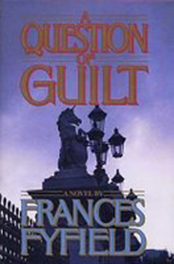Home »

Novel shows plenty of promise for Fyfield
Book Review
By Derryll White
Fyfield, Frances (1988). A Question of Guilt.
This is Frances Fyfield’s first novel. She is a practicing lawyer with experience in the police and judicial system. What she brings with her to writing is an uncanny ability to build characters, both primary story participants and very secondary players. She keeps everything engaged.
 Helen West, a Crown Prosecutor in this novel, draws on Fyfield’s legal experience, reflects it in fact. She is typically British – class conscious, socially adept and practical. Where she deviates from the norm is that she has compassion for many of those she is prosecuting. I believe Helen West speaks often here, and eloquently, for the professional lawyer part of Frances Fyfield.
Helen West, a Crown Prosecutor in this novel, draws on Fyfield’s legal experience, reflects it in fact. She is typically British – class conscious, socially adept and practical. Where she deviates from the norm is that she has compassion for many of those she is prosecuting. I believe Helen West speaks often here, and eloquently, for the professional lawyer part of Frances Fyfield.
The reader has to work with this novel, perhaps because it is Fyfield’s first. There is little economy. The scenes are large and fat, and sometimes I lost my way, having to look back in order to keep the story together and on track in my own mind. But even in that there is the power and hint of future economy that Fyfield will achieve. Her dwelling on the character of the waif Peter is rich in human compassion. Helen West’s awakening to Detective Superintendent Geoffrey Bailey, and his to her, is as beautiful and touching a precursor to love as anything in Judith Wright’s ‘The Nature of Love,’ a book I think quite definitive on the subject.
In the end the novel subsists, lets go of its many threads and softly attempts to tie all together. I don’t think that Frances Fyfield achieves the closing that her writing self gives promise to. She shows that promise to be a strong voice and a potential master of her craft. I know I will try more of her work.
********
Excerpts from the novel:
RESIGNATION – Detective Superintendent Bailey, yawning in the gloom of the interview room, had ceased to contemplate the nature of happiness, or even trouble his mind with a prospect so unrealistic. Such an abstraction was not his concern and he had ceased to desire a state so unattainable, preferring survival with dignity.
BRITISH VIOLENCE – “Blond solicitor’s wife brutally beaten to death in own £400,000 home; no clues whatever. Husband questioned but released. ‘I’m broken hearted,’ he said to our reporter.” Shocking stuff even in North London terms, where the Turks shot the competition for drugs, the Irish broke skulls as often as they broke bread, and the indigenous population had a fashion in mugging babies.
WOMEN – He wondered if Helen West’s independence was as complete as it seemed or as final as his own, since instinct told him she lived alone. Probably: such women were strong, so much more complete as creatures and so skilled in compromise.
READING – …such unadventurous pastimes among the shelves of books which fed his imagination with everything from history to drama and all the endless detective fiction he consumed with such scornful fascination? The eclectic collection of a late self-educated man.
CLASS – As a grown child utterly frustrated by knowledge he could not share, Ed understood with complete clarity all the defecating, spoiling breed of juvenile burglars, who would have cut the paintings with Stanley knives, aerosoled the walls with obscenities, fouled like dogs on the carpets, saying with obscene gesture what they could not say in words, envy and hate thrown at the old lie of equality.
SELF-ANAYSIS – Looking at self after midnight was always a bad idea. Especially when you hated what you saw, the virtues in particular, since virtues were unlovable assets. Helen was wishing she had the strength of wickedness with none of the instinct to be good.
LOVE – Love was what it was: she knew that. It was always love, for man, woman, or child, if it stopped your sleep with the sheer weight of longing to see them happy.
 – Derryll White once wrote books but now chooses to read and write about them. When not reading he writes history for the web at www.basininstitute.org.
– Derryll White once wrote books but now chooses to read and write about them. When not reading he writes history for the web at www.basininstitute.org.







